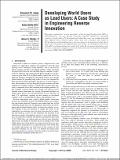Developing World Users as Lead Users: A Case Study in Engineering Reverse Innovation
Author(s)
Judge, Benjamin M; Holtta-Otto, Katja Mia Marjaana; Winter, Amos G.
DownloadDeveloping world.pdf (1.624Mb)
PUBLISHER_POLICY
Publisher Policy
Article is made available in accordance with the publisher's policy and may be subject to US copyright law. Please refer to the publisher's site for terms of use.
Terms of use
Metadata
Show full item recordAbstract
This paper examines the “reverse innovation” of the leveraged freedom chair (LFC), a high-performance, low-cost, off-road wheelchair originally designed for developing countries. A needs study of 71 developed world wheelchair users was conducted through three different data collection efforts. These data were contrasted with studies of 125 developing world wheelchair users, who were shown to be lead users for their developed world counterparts. The GRIT freedom chair (GFC), the developed world version of the LFC, was designed based on results of the study. By recognizing developing country users as lead users, designers can reveal latent needs and create globally disruptive innovations.
Date issued
2015-05Department
Massachusetts Institute of Technology. Center for Innovation in Product Development; Massachusetts Institute of Technology. Department of Mechanical EngineeringJournal
Journal of Mechanical Design
Publisher
ASME International
Citation
Judge, Benjamin M., Katja Hölttä-Otto, and Amos G. Winter. “Developing World Users as Lead Users: A Case Study in Engineering Reverse Innovation.” Journal of Mechanical Design 137, no. 7 (May 19, 2015): 071406.
Version: Final published version
ISSN
1050-0472